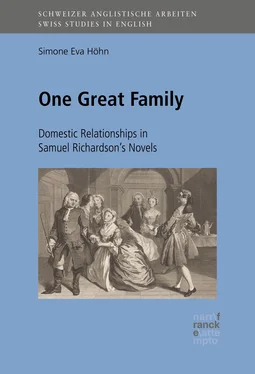It is not my contention that the system of duty was the only way to conceptualise relationships in the mid-eighteenth century. Alternatives existed; I will discuss some of them in part II of this study (including LockeLocke, John’s Two Treatises of Government ) . Moreover, then as now, some people simply flouted the dominant system of morality; then as now, they might even be proud of it. This attitude is exemplified in the figure of the rake or libertine, who is neither “restricted by convention or tradition” nor “restrained by morality” ( OED , “libertine, n. ”). I argue, however, that the system of duty is vital in order to understand some of the dilemmas in which Richardson’s heroines find themselves, and to contextualise some of the solutions which are offered to these problems. In the following sections, I will, thus, first describe the system of duty as outlined by AllestreeAllestree, Richard and DelanyDelany, Patrick, correspondent of Richardson. I will then show how this system figures in Richardson’s novels, particularly Clarissa , which features the most extended and destructive conflict of duties in his work. In the process, I will discuss further problems raised by this system, notably the relationship between duties regarding mental processes and outward action, respectively – or, to put it differently, between true virtue and hypocrisy.
1.1 Allestree, Delany and reciprocal duties
Allestree, RichardDelany, Patrick, correspondent of Richardson The Whole Duty of Man remained in print well over a century after its first publication. Its quotable title may have further contributed to its inclusion in Richardson’s first novel, where Pamela herself testifies to its worth. When she writes to her parents towards the end of the second volume, arranging their visit to the Bedfordshire estate and their later settlement on one of Mr. B.’s farms, she asks them to give presents to former benefactors: “As Farmer Jones has been kind to you, as I have heard you say, pray, when you take Leave of them, present them with three Guineas worth of good Books, such as a Family-Bible, a Common-Prayer, a Whole Duty of Man, or any other you think will be acceptable” (476). The work may, however, be more familiar from a more memorable passage in Henry Fielding’s first parody of Pamela , where the eponymous anti-heroine ShamelaFielding, Henry packs up her belongings. They include “ The Whole Duty of Man , with only the Duty to one’s Neighbour, torn out” (332).1
Knowledge of Christian tenets is hardly requisite to grasp the irony of the juxtaposition of the totality implied in the work’s title and the sadly fragmentary state of ShamelaFielding, Henry’s copy. A cursory acquaintance with the New Testament suffices to recognise that the missing part alludes to the parable of the Good Samaritan (Luke 10), and thus to one’s duty to all men. Further, albeit perhaps less funny, ironies are present to readers familiar with The Whole Duty of Man . Shamela’s easy dismissal of the missing chapter – it is “only” the duty to one’s neighbour which she misses reading – emphasises her selfishness. Presumably, she is more comfortable reading passages dealing with one’s duty to God (and, by association, to his ministers, with one of whom she has a bastard child) and one’s duty to oneself. However, a cursory survey of AllestreeAllestree, Richard’s account of our “DUTY to our SELVES” shows how far Shamela is from discharging even this – for it means to live “Soberly” and to possess the virtues of humility, meekness, consideration, contentedness with one’s condition, diligence in the care of one’s soul, chastity, and temperance. The reader will be hard-pressed to find evidence of any of these in Shamela. The duty to oneself, AllestreeAllestree, Richard explains, consists in “keeping within those due bounds which God hath set us” (139; Sunday VI) so as to avoid immediate ills (such as sickness or a bad reputation) and to prevent the punishment of hell-fire: “ Think with your selves, how you will be able to endure Everlasting Burnings” (preface, section 6, n.p.). Similarly, DelanyDelany, Patrick, correspondent of Richardson names some of the duties to oneself as “ministerial virtues; as being subservient to virtues of greater consequence” (108; sermon VI). While self-interest is acknowledged as a motive for human action, this is legitimate only in the context of the larger scheme of one’s eternal welfare – the opening sentence of the preface to The Whole Duty of Man , section 1, states that the “Treatise” is “a short and Plain Direction to the very meanest Readers, to behave themselves so in this world, that they may be happy for ever, in the next”. Next to the gratitude that, as AllestreeAllestree, Richard emphasizes, is due to God’s mercy, fear of punishment is the most pervasive argument for doing one’s duty, although he also stresses the folly or cruelty of not doing one’s duty to one’s ‘neighbour’ or oneself.
The above-mentioned tripartite structure of The Whole Duty of Man is based on Titus 2.12. From this passage, AllestreeAllestree, Richard states, we learn “ That we should live soberly, righteously, and godly in this present world ; where the word, Soberly , contains our duty to our Selves ; Righteously , our duty to our Neighbour ; and Godly , our duty to God ” (4; Sunday I). The text as a whole is relatively loosely structured. It is divided into 17 chapters (divisions being based mainly on chapter length), “[o]ne whereof being read every Lord’s Day, the Whole may be read over Thrice in the Year” (title page). Allestree starts with the duty to God, highest and the basis of all other duties, goes on to the duty to one-self, and ends with the duties to other men. These take up roughly 5, 4, and 8 Sundays, respectively. Although cross-references are frequent, they tend to emphasize that all duties – or “debts” (e.g. 267; Sunday XIII) – ultimately are duties to God. Allestree makes it clear that “there is no sin we commit but is either mediately or immediately against [God]. For though there be sins both against our Selves and our Neighbours, yet they being forbidden by God, they are also breaches of his Commandments, and so sins against him” (129; Sunday V). What is usually missing from such cross-references is the attempt to negotiate the relative importance of duties or potential problems when they clash.
AllestreeAllestree, Richard opens the sermons dealing with one’s duty to one’s neighbour with the general duties of “Justice and Charity” (213; Sunday X), which include, among other things, respect towards others’ property and reputation. He proceeds to specific status duties, beginning with the most important and hierarchical one, the duty to “the Civil, the Spiritual, the Natural” parents (i.e. ruler, clergy, and biological parents; 288; Sunday XIV), followed by the duty of parents to their children. He then goes on to “[t]he second sort of Relation […] that of a Brother” (317; Sunday XV). While this “may in the largest extent contain under it all Mankind” (317), Allestree specifically includes under this heading siblings and more distant relations, spouses, friends, and masters and servants. The final sermons mainly concern the duty of charity, which is due to everyone.
Interestingly, AllestreeAllestree, Richard includes some hierarchical relationships in his list of brotherhood ties. He does so without further comment, or is at least not careful to demarcate the point when he ceases to speak of relationships between equals. What seems to matter about ‘brotherhood’ is, apparently, not equality, but closeness. This is all the more remarkable because of the general consensus that the relationship between husband and wife is hierarchical. The early feminist Mary AstellAstell, Mary, for example, concluded that a woman “who Marrys ought to lay it down for an indisputable Maxim, that her Husband must govern absolutely and intirely, and that she has nothing else to do but to Please and Obey” (116). If the tone of her remark is bitterly ironic, she nevertheless subscribed to its general tenor. Because women are valuable beings, and because wives ought nevertheless to obey, women should “duly examine and weigh all the Circumstances, the Good and Evil of a Married State” before they decide for or against it (127; cf. also TaylorTaylor, E. Derek, Reason and Religion 69). Similarly, Hester MulsoMulso, Hester, correspondent of Richardson, who argued against Richardson that the duties of sons must be the same as the duties of daughters, acknowledged a difference of duties in the case of husband and wife – based on the marriage vows (Mulso 236–7). The relationship of brotherhood, then, can be understood only as the relationship between potential , not actual, equals. By grouping together diverse sorts of relationships, Allestree emphasizes anew the paramount importance of the father-child relationship – while skimming over conflicts in other hierarchical relationships.
Читать дальше












